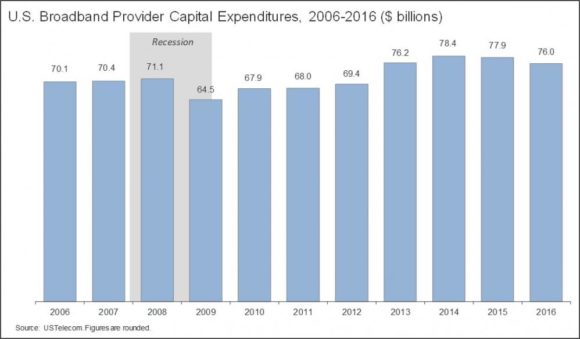The FCC voted to repeal net neutrality rules yesterday. That basically means that internet service providers have more control over the flow of internet traffic into your home. The worry here is that this means they might start charging customers more for usage.
This is a complex debate, but I tend to think there’s a lot of overreaction on both sides. The crazy thing about the internet is that we’ve all kind of been spoiled by it. It was designed as a government program and basically handed to the public for free. But over time the internet has become increasingly controlled by the private sector and that means corporations have to bear the cost of maintaining the network. And here’s the big problem – US broadband providers are barely investing in that infrastructure:

The reason for this is relatively simple – the telco’s are getting double whammied here. Not only are they unable to charge the high data using entities on their network, but they’re seeing their consumers “cut the cord” and unsubscribe from their cable usage. Consumers are swapping from cable to Internet and increasingly adding to the data burden on the network. Consumers are trying to have their cake and eat it too by swapping to lower cost high data using online services. And the telcos are responding by increasing the consumer cost of Internet usage. The worry now is that the cost of all these other services are about to start rising as Netflix and other high data users pass on their costs.
This is a much more complex discussion than the two sides are making it out to be, but I think a big part of what’s going on here is that the Internet is this amazing productivity boosting growth engine that we’ve all been massively underpaying for. We so massively underpay for it that it’s reducing our GDP by 0.74% per year. For instance, when I Google something I often click on Wikipedia and see them literally begging for donations. The same is true across many large websites. Even small websites like this one are incredibly cost intensive, but the user pays nothing. It will always stay that way here at Pragcap, but I think we’re slowly coming to grips with the reality of the Internet – it’s expensive for the providers to operate and maintain.
But here’s the real kicker – in the end I think both sides are arguing for a corporate handout. The Net Neutrality crowd is essentially arguing that the broadband providers should subsidize the big data users like Netflix and we all end up paying higher Internet fees through increased broadband prices. And the anti-Net Neutrality crowd is arguing that the broadband providers should have the option to charge these heavy data users fees and we will end up paying the extra costs when companies like Netflix pass on the cost. In the end the two sides are lobbying for different sides of the corporate coin.¹
I can’t say that I have a strong opinion one way or another on this topic because we end up with higher consumer prices either way. I wish the Internet would stay exactly the way it is with its relatively low consumer cost structure, but the underlying economics of the Internet look pretty cut and dry to me – it’s very expensive to maintain and operate the underlying infrastructure. As those costs rise consumers are trying to avoid them, but those costs are going to be paid by consumers one way or another either through the cost structure of the content providers or the cost structure of the service providers.²
As for whether this will destroy the Internet? No, it won’t as long as the FTC does their job and ensures that none of these companies impose monopolistic pricing over consumers. And as long as those regulations are enforced we should see continued competition in content and broadband that will continue to increase the social value of the Internet.
In sum, the Internet is an unbelievably valuable resource that we’ve all been underpaying for for a long time. And as it becomes increasingly integral to our economy and more costly to maintain I am afraid there’s no way we can avoid the fact that consumers will increasingly bear the burden of that economic reality in the future. We’ve been having our cake and eating it too, but the time is coming for us to be more thoughtful about how we consume that cake because it’s scarcer than we have been led to believe.
¹ – Some users have referred to the false analogy of “fast lanes” and “slow lanes” where the broadband providers might pick and choose what services get fast speeds and slow speeds. But this is not what’s really happening. The Internet infrastructure is not like fast lanes and slow lanes. Instead, they are running into an issue where companies like Netflix are slowing down all the lanes because they are clogging traffic. The question is not whether Netflix should get the fast lane, but whether Netflix should help pay to expand the highway.
² – Some people are rightly worried about abuse(this is especially true in monopolized regions), but this issue was never about being able to charge companies and discriminating against who gets the fastest speeds. For the ISPs the debate has always been about how to treat the highest data using companies and whether they should help pay for the infrastructure they’re using so much of.
Mr. Roche is the Founder and Chief Investment Officer of Discipline Funds.Discipline Funds is a low fee financial advisory firm with a focus on helping people be more disciplined with their finances.
He is also the author of Pragmatic Capitalism: What Every Investor Needs to Understand About Money and Finance, Understanding the Modern Monetary System and Understanding Modern Portfolio Construction.

